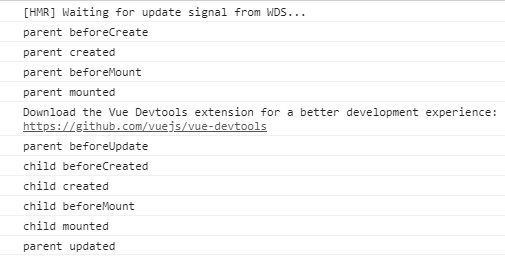钩子函数的运行情况,及各钩子函数的意义如下
<!DOCTYPE html>
<html lang="en">
<head>
<meta charset="UTF-8">
<meta name="viewport" content="width=device-width, initial-scale=1.0">
<meta http-equiv="X-UA-Compatible" content="ie=edge">
<title>Document</title>
</head>
<script type="text/javascript" src="https://cdn.jsdelivr.net/vue/2.1.3/vue.js"></script>
<body>
<div id="app">{{msg}}</div>
<script>
var vm = new Vue({
el: '#app',
data: {
msg: 'hello world',
},
beforeCreate: function() {
console.log('创建前');
console.log(this.msg);
console.log(this.$el);
},
created: function() {
console.log('创建之后');
console.log(this.msg);
console.log(this.$el);
},
beforeMount: function() {
console.log('挂载之前');
console.log(this.msg);
console.log(this.$el);
},
mounted: function() {
console.log('挂载之后');
console.log(this.msg);
console.log(this.$el);
},
beforeUpdate: function() {
console.log('更新之前');
console.log(this.msg);
console.log(this.$el);
},
updated: function() {
console.log('更新完成');
console.log(this.msg);
console.log(this.$el);
},
beforeDestroy: function() {
console.log('组件销毁之前');
console.log(this.a);
console.log(this.$el);
},
destroyed: function() {
console.log('组件销毁之后');
console.log(this.msg);
console.log(this.$el);
},
})
</script>
</body>
</html>
1
2
3
4
5
6
7
8
9
10
11
12
13
14
15
16
17
18
19
20
21
22
23
24
25
26
27
28
29
30
31
32
33
34
35
36
37
38
39
40
41
42
43
44
45
46
47
48
49
50
51
52
53
54
55
56
57
58
59
60
61
2
3
4
5
6
7
8
9
10
11
12
13
14
15
16
17
18
19
20
21
22
23
24
25
26
27
28
29
30
31
32
33
34
35
36
37
38
39
40
41
42
43
44
45
46
47
48
49
50
51
52
53
54
55
56
57
58
59
60
61
此时组件的钩子函数的输出结果如下所示:

总结: 通过对比 mounted 和 beforeMount 钩子函数的运行前后,我们可以发现他们的区别在于组件是否被编译。即view 中的数据是否被编译完成。
通过实践发现,组件的不同引用方式,父组件的钩子函数的运行情况也是不一样的。
# 1、第一种情况(动态引入):直接在components中通过import动态引入。
//hookParent.vue
<template>
<div>
<hook-child/>
</div>
</template>
<script>
import hookChild from "./hookChild"
export default {
name:"hookParent",
data(){
return{
show:false
}
},
components:{
hookChild,//静态引入
// hookChild:()=>import("./hookChild") //动态引入
},
beforeCreate(){
console.log("parent beforeCreate");
},
created(){
console.log("parent created");
},
beforeMount(){
console.log("parent beforeMount");
},
mounted(){
console.log("parent mounted");
},
beforeUpdate(){
console.log("parent beforeUpdate");
},
updated(){
console.log("parent updated")
},
beforeDestroy(){
console.log("parent beforeDestroy");
},
destroyed(){
console.log("parent destroyed");
},
activated(){
console.log("parent activated");
},
deactivated(){
console.log("parent deactivated")
},
}
</script>
//hookChild.vue
<template>
<div>
<div @click="update">修改msg的值————{{msg}}</div>
<div @click="destroy">销毁子组件</div>
</div>
</template>
<script>
export default {
name:"hookChild",
data(){
return{
msg:"ceshi"
}
},
beforeCreate(){
console.log("child beforeCreated");
},
created(){
console.log("child created");
},
beforeMount(){
console.log("child beforeMount");
},
mounted(){
console.log("child mounted");
},
beforeUpdate(){
console.log("child beforeUpdate");
},
updated(){
console.log("child updated")
},
beforeDestroy(){
console.log("child beforeDestroy");
},
destroyed(){
console.log("child destroyed");
},
activated(){
console.log("child activated");
},
deactivated(){
console.log("child deactivated")
},
methods:{
change(){
this.msg="修改了";
},
destroy(){
this.$destroy();
}
}
}
</script>
1
2
3
4
5
6
7
8
9
10
11
12
13
14
15
16
17
18
19
20
21
22
23
24
25
26
27
28
29
30
31
32
33
34
35
36
37
38
39
40
41
42
43
44
45
46
47
48
49
50
51
52
53
54
55
56
57
58
59
60
61
62
63
64
65
66
67
68
69
70
71
72
73
74
75
76
77
78
79
80
81
82
83
84
85
86
87
88
89
90
91
92
93
94
95
96
97
98
99
100
101
102
103
104
105
106
107
108
109
110
2
3
4
5
6
7
8
9
10
11
12
13
14
15
16
17
18
19
20
21
22
23
24
25
26
27
28
29
30
31
32
33
34
35
36
37
38
39
40
41
42
43
44
45
46
47
48
49
50
51
52
53
54
55
56
57
58
59
60
61
62
63
64
65
66
67
68
69
70
71
72
73
74
75
76
77
78
79
80
81
82
83
84
85
86
87
88
89
90
91
92
93
94
95
96
97
98
99
100
101
102
103
104
105
106
107
108
109
110
此时父子组件的钩子函数的输出结果如下所示:

通过监听钩子函数运行发现,当 mounted 钩子函数运行后,才会在界面上显示所挂载的元素。并且子组件的mounted钩子函数要晚于父组件的mounted钩子函数,子组件是在父组件的beforeUpdate和 updated 钩子函数之间加载的。同时也说明组件动态引入方式子组件是在父组件挂载之后才挂载的。
# 2、第二种情况(静态引入):import hookChild from "./hookChild。钩子函数的运行情况如下:
相对于组件的动态引入方式,组件的静态引入方式的父组件少调用了 beforeUpdete 和 updated 两个钩子函数。
# 3、占位符(slot)的功能其实和动态组件的运行情况是一样的
总结:
1、在销毁父组件时(不管是在子组件中销毁父组件还是直接在父组件中销毁父组件),都会先销毁子组件,然后才会销毁父子键。
2、父子组件中单独更新各自的数据相互不会受影响。就算有影响也是父组件先调用 beforeUpdate() 函数,然后子组件调用 beforeUpdate() 和 updated() 函数,其次才是父组件的 updated() 函数。
← vue常见知识点总结 vuex的常用api →